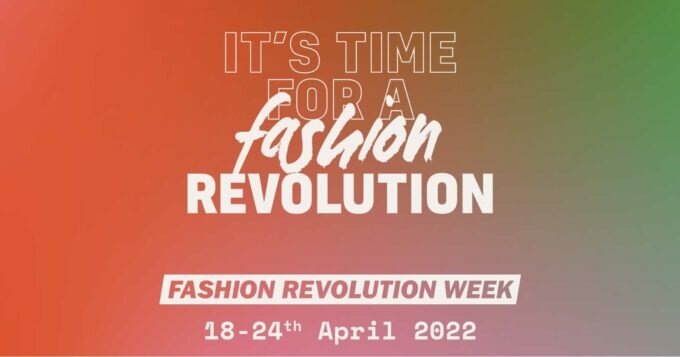It’s shocking to think that the value of unused clothing in wardrobes is estimated at £30 billion and a further £140 million pounds worth of clothing is sent to landfill each year.1

Individuals in the U.K. buy more clothes than any other country in Europe each year with the fashion industry fuelling this need for a throwaway, fast fashion culture as garments are sold at low prices and are often made using low-quality materials.
Although we buy more clothes than we used to, less money is spent and this desire to wear cheap new looks on a continual basis has led to harsh manufacturing practices and conditions for workers who make our clothes.2

In 2019, the UK government responded to concerns about fast fashion’s environmental impact and the wider impact on workers’ lives and health. Several online retailers were called to Parliament so that a full environmental audit could be completed to explore the issues in-depth and to look at how clothes are made.3
The chair of the Environmental Audit Committee, Mary Creagh quotes, ‘Low-quality £5 dresses aimed at young people are said to be made by workers on illegally low wages and are discarded almost instantly, causing mountains of non-recycled waste to pile up.’4

All retailers who were invited to parliament noted that further transparency was needed between customers and businesses on their own sustainable practices whilst also discussing the need for increased education on how customers can wear items multiple times to combat this throwaway, fast-fashion culture.5
In 2021, the UK government announced plans that will take action on fast fashion production and hold clothing producers to account for textile waste. The scheme will ensure that the fashion industry contributes to recycling costs and will encourage improved design and labelling. They believe this will help to increase the reuse and recycling of textiles and reduce the industry’s large environmental footprint.
Consumers, retailers, brands, policymakers and leaders all have a significant role to play in eradicating unethical practices. They must all work together to consider the negative impact that fashion has on the environment.
How can the impact of fast fashion be minimised and how can the lifecycle of our clothes be extended? We need to consider what we buy and who we buy from. The Fashion Revolution campaign helps us to do that.
This year, Fashion Revolution Week is taking place from 18 – 24 April 2022 and the theme is MONEY FASHION POWER. In the fashion industry today, garment workers and natural resources continue to be exploited. Growth and profit are the top priority, which benefits the wealthy and powerful owners of mainstream fashion retailers and brands.
Overconsumption is the consequence of producing too much clothing too quickly. Most of the people that make our clothes are not paid fairly so they are unable to meet their basic needs. The fashion industry is also fueling the climate crisis, which has a negative impact on garment workers.
The aim of the Fashion Revolution is to bring everyone together so that we can work towards changing the way clothes are made, sourced, produced and consumed. In order for this to happen, it takes a collective effort that won’t just happen overnight.
Although Fashion Revolution is an ongoing, all-year-round movement, Fashion Revolution Week becomes a focus week that presents an opportunity for brands to be transparent about their supply chain and ethical practices and to think about how they could contribute to a more sustainable fashion future.
For consumers, it presents an opportunity to ask #whomademyclothes and to empower individuals to realise they could make a lasting positive difference by making a few small changes.
Small changes that individuals can make to help the fashion industry become more sustainable include:
Learn more about the current ethical issues in the fashion industry and what you can do to help!

Support Fashion Revolution Week by taking the time to think about where your clothes come from and what you can do to extend their lifecycle!
Here at Kitenge, our ethos that we preach is to buy less, choose well and make it last thus supporting the ‘slow fashion’ movement.
Kitenge’s colourful and unique African print clothing is handmade using 100% locally grown, African cotton and each purchase you make helps to empower Tanzanian tailors and support the African textile industry. We even recycle all our offcuts and make accessories such as bow ties and pocket squares.
Find out more about our sustainable clothing ethically handmade in Tanzania.


Kitenge’s master tailor, Abdallah, (left) making a pair of custom-made African print trousers and one of his apprentices, Hassan, (right)
Our made to measure garments are lovingly made to order, using the finest African wax print fabric, and we hold limited ready-to-wear stock which reduces waste. We believe made to measure clothing is the future of a sustainable fashion industry. Clothes that are handcrafted by expert tailors to fit perfectly using high-quality materials will last for years to come.
During Fashion Revolution Week, why not take a look at the bright and colourful range of men’s and women’s African clothing from Kitenge and know that when you make a purchase it will be an ethical one!
SHOP ETHICAL & SUSTAINABLE CLOTHINGNotes:
1. http://www.wrap.org.uk/content/clothing-waste-prevention
2. https://www.fashionrevolution.org/about/why-do-we-need-a-fashion-revolution/
3. https://www.theguardian.com/fashion/2018/nov/27/mps-criticise-high-street-fashion-throwaway-culture
4. https://www.cnbc.com/2018/11/09/amazon-and-asos-quizzed-by-lawmakers-over-fast-fashion-sustainability.html
5. https://www.drapersonline.com/news/fast-fashion-retailers-defend-practices-in-parliament/7033236.article
Sign up to get 10% off your first order!
